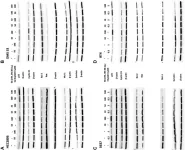(Press-News.org) EMBARGOED FOR RELEASE UNTIL 4 P.M. ET, MONDAY, MARCH 4, 2024
MINNEAPOLIS – Certain medications for multiple sclerosis (MS) called monoclonal antibodies, taken while breastfeeding, may not affect the development of a child during the first three years of life, according to a preliminary study released today, March 4, 2024. The study will be presented at the American Academy of Neurology’s 76th Annual Meeting taking place April 13–18, 2024, in person in Denver and online. The study examined four monoclonal antibodies for MS: natalizumab, ocrelizumab, rituximab and ofatumumab.
MS is a disease in which the body’s immune system attacks myelin, the fatty white substance that insulates and protects the nerves. Symptoms may include fatigue, numbness, tingling or difficulty walking.
“Most monoclonal antibody medications for multiple sclerosis are not currently approved for use while a mother is breastfeeding,” said study author Kerstin Hellwig, MD, of Ruhr University in Bochum, Germany. “Yet MS can develop during the childbearing years of life. Since the risk of MS relapses increases after giving birth, some mothers may need or want to restart these therapies, so it is important to determine whether these medications, through breast milk, have a negative impact on a child's development.”
For the study, researchers used the German MS and Pregnancy Registry to identify 183 infants born to mothers taking monoclonal antibodies while breastfeeding. Of this group, 180 had mothers with MS and the three had mothers with neuromyelitis optica spectrum disease (NMOSD). NMOSD is also a demyelinating disease, but it is rare and specifically affects the optic nerve, spinal cord or brain.
The infants were compared to another 183 infants, matched for exposure to MS medications shortly before or during pregnancy, born to mothers with the same diseases who did not take monoclonal antibodies while breastfeeding.
Of those exposed to MS medications, 125 were exposed to natalizumab, 34 to ocrelizumab, 11 to rituximab and 10 to ofatumumab. Two infants were first exposed to natalizumab and then ocrelizumab. One infant was exposed to rituximab and then ocrelizumab.
The first exposures to the medications through breastfeeding ranged from the day a child was born to the ninth month of life. Infants were breastfed for an average of five-and-a-half months while their mothers took these medications.
For all infants, researchers then examined the number of hospital stays, antibiotic use, developmental delays such as problems with social and fine motor skills and delayed speech development, and the infants’ weight at follow-up visits during the first three years of life.
After comparing infants exposed to the medications to infants not exposed, researchers found no differences in their health or development.
“Our data show infants exposed to these medications through breastfeeding experienced no negative effects on health or development within the first three years of life,” Hellwig said.
A limitation of the study was that only about a third of the infants were followed for the full three years. Therefore, Hellwig said, the results for the third year of life are less meaningful than for years one and two.
Learn more about multiple sclerosis at BrainandLife.org, home of the American Academy of Neurology’s free patient and caregiver magazine focused on the intersection of neurologic disease and brain health. Follow Brain & Life® on Facebook, X and Instagram.
When posting to social media channels about this research, we encourage you to use the American Academy of Neurology’s Annual Meeting hashtag #AANAM.
The American Academy of Neurology is the world’s largest association of neurologists and neuroscience professionals, with over 40,000 members. The AAN is dedicated to promoting the highest quality patient-centered neurologic care. A neurologist is a doctor with specialized training in diagnosing, treating and managing disorders of the brain and nervous system such as Alzheimer’s disease, stroke, migraine, multiple sclerosis, concussion, Parkinson’s disease and epilepsy.
For more information about the American Academy of Neurology, visit AAN.com or find us on Facebook, X, Instagram, LinkedIn and YouTube.
END
Good news—MS drugs taken while breastfeeding may not affect child development
2024-03-04
ELSE PRESS RELEASES FROM THIS DATE:
Programs intended to reduce health insurance premiums may make coverage less affordable for the middle class
2024-03-04
PITTSBURGH, March 4, 2024 — Reinsurance programs, which were created to help lower premiums and increase enrollment in the Affordable Care Act’s health insurance marketplaces, may have had the opposite effects for many potential marketplace enrollees, according to a study by health policy researchers at the University of Pittsburgh School of Public Health, Duke University and University of Minnesota.
The study, published today in Health Affairs, is the first to examine the effects of a post-American Rescue Plan Act ...
PrEP discontinuation in a US national cohort of sexual and gender minority populations, 2017–22
2024-03-04
In the U.S., sexual and gender minority populations are disproportionately affected by HIV. Pre-exposure prophylaxis (PrEP) is a key prevention method, but its effectiveness relies on consistent usage. While a significant body of research has addressed PreP initiation and adherence, far less attention has been paid to the reasons for and consequences of PrEP discontinuation.
A team of investigators conducted a four-year U.S. national cohort study exploring PrEP discontinuation among sexual and gender minority people who initiated PrEP. “Our cohort was entirely comprised of individuals ...
USC Study: Medicare Part D plans increased restrictions on drug coverage
2024-03-04
Medicare Part D plans significantly increased restrictions on prescription drugs, excluding more compounds from coverage or subjecting more of them to review before patients could access the treatments, according to a new study from USC researchers.
Among drugs not in Medicare “protected classes,” the share of drug compounds restricted or excluded by Part D plans surged from an average of 31.9% in 2011 to 44.4% in 2020, according to the study published in the March 2024 issue of Health Affairs. Brand-name-only compounds (those without a generic alternative) were especially limited, with more ...
Sacituzumab govitecan plus platinum-based chemotherapy in breast, bladder, and lung carcinomas
2024-03-04
“[...] these results support the rationale and potential for favorable clinical outcomes of combining SG therapy with platinum-based chemotherapeutics in solid tumors.”
BUFFALO, NY- March 4, 2024 – A new research paper was published in Oncotarget's Volume 15 on February 22, 2024, entitled, “Sacituzumab govitecan plus platinum-based chemotherapy mediates significant antitumor effects in triple-negative breast, urinary bladder, and small-cell lung carcinomas.”
Sacituzumab govitecan (SG) is an antibody-drug conjugate composed of an anti-Trop-2-directed antibody ...
Global study unveils "problematic" use of porn
2024-03-04
A major international study led by a Canadian psychologist sheds light on a hidden phenomenon: how problematic use of pornography is affecting people in different parts of the world, across various genders and sexual orientations.
Published in the journal Addiction, the research stands out because, among the 82,000 people in 42 countries studied, it looks at groups that were often overlooked in the past, including women and individuals who don't fit traditional gender categories.
In their findings, largely based on ...
Newly discovered protein prevents DNA triplication
2024-03-04
This is a natural 'anti-failure' mechanism in the DNA copying process, hitherto unknown.
The DNA molecule is copied each time a cell divides. If, instead of being copied once, the DNA is copied several times, i.e. tripled or even quadrupled, the likelihood of cancer increases..
The new discovered anti-failure system relies on a protein called RAD51 to prevent DNA that has already been copied from being copied again.
Every time a cell divides, its DNA is duplicated so that the two daughter cells have the same genetic material as their parent. This means that millions of times a day ...
Less ice in the arctic ocean has complex effects on marine ecosystems and ocean productivity
2024-03-04
Over the past 25 years, the amount of summer Arctic sea ice has diminished by more than 1 million square kilometers. As a result, vast areas of the Arctic Ocean are now, on average, ice free in summer. Scientists are closely monitoring how this impacts sunlight availability and marine ecosystems in the far north.
“Many questions arise when such large areas become ice-free and can receive sunlight. A prevailing paradigm suggests that the Arctic Ocean is rapidly becoming more productive as sunlight becomes ...
Antarctica’s coasts are becoming less icy
2024-03-04
EMBARGOED UNTIL MARCH 4, 2024 AT 3:00PM U.S EASTERN TIME
An increase in pockets of open water in Antarctica’s sea ice (polynyas) may mean coastal plants and animals could one day establish on the continent, University of Otago-led research suggests.
The research, published in the prestigious international journal Proceedings of the National Academy of Science, aimed at understanding where open water might allow coastal species to settle in the future.
Led by Research Fellow Dr Grant Duffy from Otago’s Department ...
New research shows migrating animals learn by experience
2024-03-04
THIS RELEASE IS EMBARGOED UNTIL MARCH 4, 2024, at 3:00 PM U.S. EASTERN TIME.
Research led by scientists from University of Wyoming and Max Planck Institute of Animal Behavior shows that migrating animals refine their behavior as they get older, suggesting that experiential learning is an important part of successful migration.
While genetics and social behavior are important factors shaping animal migrations, information gained through individual experience also appears to help shape migratory movements, says a research team led by Ellen Aikens. Aikens, ...
Modeling the origins of life: New evidence for an “RNA World”
2024-03-04
LA JOLLA (March 4, 2024)—Charles Darwin described evolution as "descent with modification." Genetic information in the form of DNA sequences is copied and passed down from one generation to the next. But this process must also be somewhat flexible, allowing slight variations of genes to arise over time and introduce new traits into the population.
But how did all of this begin? In the origins of life, long before cells and proteins and DNA, could a similar sort of evolution have taken place on a simpler scale? ...





